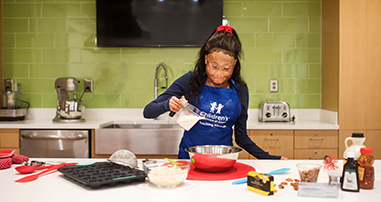
Sickle Cell Disease Facts for Teachers and School Nurses
Teachers and school nurses need to take certain actions to help children with sickle cell disease maintain their health. Simple accommodations can prevent serious complications and hospitalizations. Take a proactive approach by knowing the basics about sickle cell disease and what steps to take if a child with sickle cell disease becomes ill at school.
To speak with one of our hematology school teachers at the Aflac Cancer and Blood Disorders Center of Children’s Healthcare of Atlanta, call:
- Arthur M. Blank Hospital: 404-785-1230
- Hughes Spalding Hospital: 404-785-9546
Make sure children with sickle cell disease have water readily available at all times in class. They should be allowed to carry a water bottle at all times and to drink water during class, during physical education or at any other time.
Why it is important?
Fluids assist red blood cells in moving more easily throughout blood vessels, which ultimately decreases the number of pain crises.
Allow children with sickle cell disease to have free access to the bathroom. Provide a bathroom pass for an older child so all school personnel will be aware that permission has been granted.
Why it is important?
Children with sickle cell disease need to go to the bathroom more often due to their high fluid intake and because their kidneys do not function as well as those in healthy children.
Allow children with sickle cell disease time to rest when needed, or slow down the activity. This is particularly important during physical education. If parents prefer that their child be excused from any activity, permission should be granted. If a child has difficulty carrying textbooks, allow a rolling backpack or an extra set of books.
Why it is important?
Children with sickle cell disease tire more easily than other children. Physical exhaustion may trigger a pain crisis, which may lead to hospitalization and school absences.
Keep children with sickle cell disease out of the cold as much as possible. In hot weather, allow frequent breaks with plenty of fluid to avoid dehydration. Avoid frequent changes in temperature. Temperatures in the classroom must also be regulated. Classrooms that are too cold or too hot may cause complications requiring hospitalization. Allow children to wear a coat, hat and gloves as needed. Do not apply ice to injuries.
Why it is important?
Temperature extremes can trigger a pain crisis, which may lead to hospitalization and school absences.
Living with pain is a challenging part of sickle cell disease.
- Pain may be treated with acetaminophen, ibuprofen or a narcotic drug prescribed by a doctor. It is important to check for fever and follow the fever precautions listed below before giving medicine.
- If no fever is present, administer medications as directed and as soon as possible.
- Give plenty of fluids. To help ease the pain, try warm compresses or distractions, such as quiet activities and listening to music.
- If a child’s pain cannot be managed, call the parents immediately so they may seek medical attention.
Acute chest syndrome (ACS) is believed to be caused by sickled red blood cells clogging blood vessels in the lungs. It can also be associated with respiratory infection. Contact the parents immediately if the child has any of these symptoms:
- Fever (temperature 101°F or above)
- Chest pain
- Congested cough
- Labored breathing
- Rapid breathing
Normally, red blood cells live for 100 to 120 days. In sickle cell anemia, red blood cells live only 15 to 20 days. Due to the shorter life span of the sickled red blood cells, children with sickle cell disease are frequently anemic. Some symptoms of anemia are:
- Pale color of lips
- Headache
- Weakness
- Fatigue, decreased energy or sleeping for long periods of time
Jaundice, or yellow coloring of the eyes or skin, is caused by bilirubin, a byproduct of red blood cells. Since children with sickle cell disease break down more red blood cells, they have increased amounts of bilirubin.
Sickled cells can block blood vessels in the brain and keep the brain from getting enough oxygen. If you notice cognitive changes in the child or changes in school performance, discuss these concerns with the parent as soon as possible.
Call the parent immediately if you notice any of the following symptoms. If the parent is not available, symptoms are severe, or the student has a change in mental status or an extended seizure, call 911.
- One-sided weakness or paralysis
- Facial asymmetry
- Difficulty swallowing
- Seizure
- Slurred speech
- Very severe headache
- Sudden-onset vision change
Read Stories of Hope and Inspiration From Our Patients at the Aflac Cancer and Blood Disorders Center.
This information is to be used as general medical information and not specific medical advice. Please consult your student’s or patient’s parent or guardian for specific medical instructions, including medication administration.
Contact Us 404-785-1112

